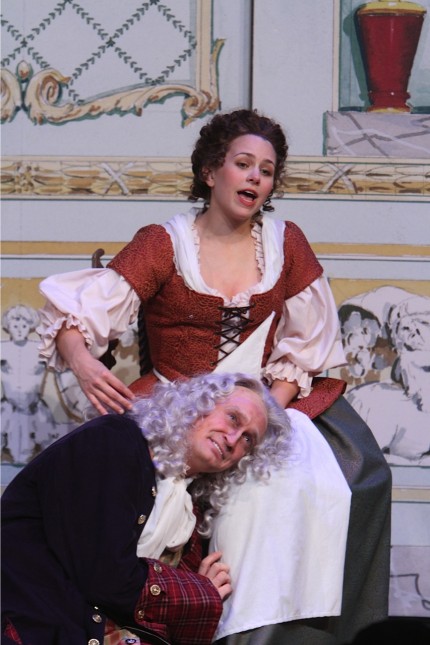Haymarket Opera’s revelatory “Pimpinone” a feast for the ears and eyes

Local performances of Baroque opera, sadly, have become a rarity with both Lyric Opera and Chicago Opera Theater avoiding anything from this era for two straight seasons.
Haymarket Opera, which opened its third season this weekend, therefore is addressing this drought by default. But the company is also presenting stunning first-class performances of Baroque opera on original instruments with singers that have early-music vocal technique—as well as lavishing scholarly attention on costumes, scenery and staging, and doing so with great aplomb.
The company’s season-opening performance of Telemann’s Pimpinone , heard early Saturday evening at Mayne Stage in Rogers Park, was a revelation on numerous fronts, and offered about the closest thing we have to operatic time travel back to the 18th century.
Despite Telemann being one of the great masters of the Baroque era, live local performances of his music have been few. Yet to experience this delightful comic triptych of intermezzi, which were originally intended to be performed between the acts of an opera seria, is equivalent to experiencing full-scale Handel operas firsthand. The quality of both the work and the performance was so extraordinary on every level, you almost had to pinch yourself.
Telemann had specified that if Pimpinone was to be performed on its own — which became increasingly commonplace as the work gained popularity in its time — that a series of Italian concertos should be sandwiched between the intermezzi to replace the acts of an opera seria.
Haymarket Opera wisely chose instead to offer shorter Telemann instrumental pieces that fit the character of the music perfectly. These, and the accompaniment of the entire opera were led by Haymarket founder and music director Craig Trompeter from his cello with great gusto and style.
The plot of Pimpinone is the battle of the sexes, done up 18th-century style, but also indicating that the more things change, the more they stay the same. Vespetta, exquisitely portrayed by soprano Erica Schuller, is a disgruntled, manipulative chambermaid who is on the prowl for a better station in life via marriage.
Pimpinone, wonderfully portrayed by bass Ryan de Ryke, is an out-of-touch nouveau riche lout. Pimpione is narcissistic and deluded enough to think that he can still attract a woman half his age on his good looks and charm, and get her to do all of his domestic dirty work and still have his cake on the side, as it were, without committing himself.
Intermezzo I shows their initial encounter on the street, encircling each other cautiously and singing set pieces separately as to their intentions to we the audience, before their meeting is unspooled via recitative. Once they have set the hooks into each other, they come closer both vocally and physically, dancing together as well as having a duet that is not true harmony yet, but made up of alternating but intertwined vocal lines reflecting that a deal has been struck.
Intermezzo II shows the couple after some time together as chambermaid and “client,” both dependent on one another to such a degree that when Vespetta threatens to leave Pimpinone’s service if he does not marry, he gives in, encouraged by her promises that she will still be his willing servant in every respect.
Vespetta’s sensitive plea, introduced by Trompeter’s haunting cello solo, is some of the most beautiful music in the opera, giving way to their first real harmony reflected in their music together during their climactic faux love duet.
Intermezzo III features the most spectacular aria in the work, a showpiece aria in which Pimpinone mocks Vespetta line by line vocally, shifting register from falsetto to his natural voice, done by de Ryke with extraordinary vocal technique with considerable confidence and swagger.
The high price of his mockery and violent threats against her for breaking her promises are soon revealed as the increasing dissonance between them, which is brilliantly reflected in the music that gives way to chaos and a full-scale slapstick battle hysterically staged, all the more amazing as both are singing their hearts out simultaneously.
At the conclusion of the opera, with its feeble attempt to moralize about an encounter where both parties are no less guilty, the audience was on its feet cheering at a truly extraordinary afternoon of mirth and mayhem.
Posted in Performances




